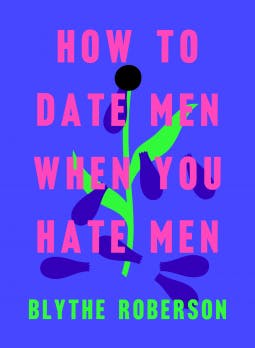As titles go, How to Date Men When You Hate Men is exemplary: clear, rhyming, and conceptually precise. The first book from comedy writer Blythe Roberson (The New Yorker, The Onion, The Late Show with Stephen Colbert) is a collection of essays organized along the narrative arc of a (straight) relationship, with section titles like “Crushes,” “Flirting,” and “Psychic Wounds.” It’s written in a slightly hyperventilating style, full of all-caps emphasis and exclamation marks. In that sense it’s a contribution to the genre of satirical feminist prose, which runs from Fran Lebowitz through Nora Ephron to Tina Fey, Mindy Kaling, and Sloane Crosley.
Roberson’s premise is this: Sexism runs vertically across all of human history, and horizontally across all of society. This makes navigating desire for men in 2018 “like trying to kiss your sweet crush while a cement mixer operated by Woody Allen is dumping raccoons on you.” So, what’s a girl to do?
Like all of the above authors, Roberson writes with scathing self-deprecation and ambitious analytical flair. Between descriptions of her “personal experiences as a horned-up perv” who stays perennially single, she smuggles citations from Barthes’s A Lovers’ Discourse, the novels of Elena Ferrante, and Dave Chappelle’s “take it to the next level” speech in You’ve Got Mail. She discusses the social problem of wanting to be one’s crush, referencing Claire Vaye Watkins’s essay “On Pandering,” but also burns to a crisp certain bad apples who have broken her heart. The book proposes to advise a young reader how to navigate the political and practical problems of female heterosexuality, but ends up eviscerating Roberson’s own difficult romantic experiences and celebrating the sense of self she has won while on that journey.
It’s that self-pummeling that also makes the book very difficult to read. How to Date Men When You Hate Men is extremely funny but also a document of timeless agony. In describing unreciprocated crushes or dates-that-aren’t-a-date in humorous terms, Roberson also describes experiences so awful that it is sometimes hard to understand why she persists with them. She describes men who don’t listen; men whose confusing texts she deciphers into totally different meanings; men who operate with “laissez-faire who-gives-a-shit distance.”
The experience of reading this book is at times like watching somebody run into a wall they can’t see, over and over again, while they describe the wounds they’re sustaining in minute and entertaining detail. From a different angle, it’s akin to watching a young woman coming to political consciousness in her personal relationships. In one early passage, Roberson describes her revelation that all this emotional labor was sapping her brainpower:
I came to this conclusion when a guy was giving me strange signals for months and I was using my brain to its full capacity trying to figure out what the hell was going on. I realized: oh, this is a political issue, because instead of focusing on the intersectional-socialist-matriarchal revolution I’ve been focusing on whether or not what just happened was a date.
And there she stays. What follows this revelation is a forensic investigation into how that mental sabotage happens, rather than particularly useful advice on how to survive it. There is some value in this: Books of feminist cultural commentary usually speak from a position of having understood, rather than doing the exhausting work of trying to understand.
Furthermore, Roberson’s achievement in remaining funny while excavating her pain is just straightforwardly heroic. Here’s Roberson on letting unenthusiastic men go free, for example: “I am not trying to trick men who aren’t totally aboard the SS Blythe Is Hot and Fun into marrying me. I’m not trying to trap men! Except Harry Styles, but I’m not trying to trap him into dating me, I’m just trying to trap him.”
By the end of How to Date Men When You Hate Men I couldn’t help but wonder—have you considered political lesbianism, Blythe Roberson? It might sound like a joke, but the concept has enjoyed a resurgence in contemporary feminism. Sprouting from the radical feminist movement within the 1970s second wave, political lesbianism is related to lesbian separatism, and promotes the idea that a woman can break from heterosexuality and simply refuse to incorporate sex with men into their lives. (The separatist movement has been sullied lately by adopting transphobic rhetoric, but its influence remains.)
One seminal text from 1981—“Love Your Enemy? The Debate Between Heterosexual Feminism and Political Lesbianism”—by the Leeds Revolutionary Feminist Group argues that, “The heterosexual couple is the basic unit of the political structure of male supremacy.” Any feminist “can and should be political lesbians,” they write. Roberson’s book almost reads like evidence collected by the lesbian separatist prosecution, but it comes down in favor of the messier, more real problems of trying to live in a world where desire for men just can’t be dispensed with that easily. Embedded within How To Date Men When You Hate Men is the insoluble truth that Roberson both desires and loathes men. She forces herself to acknowledge that double bind, then persists through the paradox instead of opting out.

In the end, Roberson’s insistence on feeling her pain and keeping it makes How to Date Men When You Hate Men a more radical text than it claims to be. Her tone is the opposite of pompous. As the book draws to a close, Roberson muses, “We’ve got one go on this floating orange to squeeze out as much happiness as we can, and love is a pretty significant citrus press.” Her love for men is an uncomfortable fact, precluding her advice book from giving much actual advice. But it turns out to be an invaluable testament to living through heterosexuality. With a great deal of frenzied condemnation and an equal amount of self-forgiveness, this book points out new directions for writing about the oldest problems women face. Keep your love wounds, Roberson argues, and make them into copy: You might as well get something out of it.
